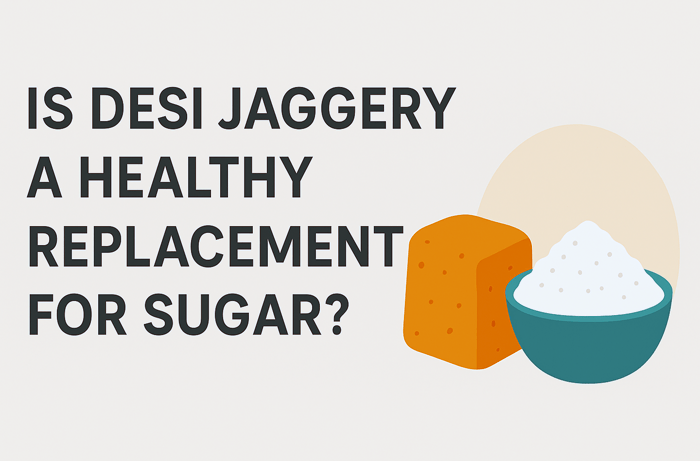Is Desi Jaggery (Goad) a Healthy Replacement for Sugar?
By Dr. Rushikesh Trivedi, DNA-Based Diet Expert, Ahmedabad
Traditionally, the Indian kitchen treated clean jaggery as something more than a simple sweetening agent: a tradition, a home remedy, or even a sign of purity. Due to increased awareness of the detrimental effects of refined sugars, jaggery became popular as a “healthier” alternative. But is it really so? Let us consider this from a nutrition-DNA compatibility angle.
What is Desi Jaggery?
Desijaggery also is a type of natural sweetener. It is made from the concentration of sugarcane juice or palm sap without any chemical processing. While refined sugars go through a process that removes all nutrients and mineral elements, jaggery preserves its traces of minerals and vitamins like iron, magnesium, potassium, calcium, and antioxidants. It is usually golden or dark-brown in hue with a slightly earthy taste depending on the source and preparation method.
Is Jaggery Healthier Than Sugar?
Yes — only very marginally and in small quantities.
Jaggery has micronutrients that white sugar does not, mainly iron. This might help an individual suffering from mild anemia. However, this level of nutrients is so insignificant in treating any kind of deficiency that it never should be relied on as a primary source of these minerals.
According to traditional medicine systems such as Ayurveda, jaggery is a liver cleanser and aids in cleaning the respiratory tract by helping to expel toxins and clear phlegm, which is most beneficial in winter.
This provides a quick energy boost in the same way that sugar does, though the release is somewhat slower because of its mineral content. It is less refined than common sugar and to some degree may trigger fewer suck-inducing sugar cravings, which could probably make it less addictive.
But Be Cautious — It’s Still Sugar
So, even while jaggery is one possible sugar form, it too shall result in numerous health ailments if consumed abundantly. Such can be weight gain, blood sugar spiking, insulin resistance, tooth decay, and increasing triglycerides.
However, in type-2 diabetes or insulin resistance, jaggery will cause a similar hike in blood sugar as will ordinary sugar. The glycemic index (GI) has a slight elevation in comparison to the glycemic index of white sugar, which means blood sugar levels will further increase. This type of simple sugar is ill-suited to persons enduring glucose metabolism problems.
What Does DNA-Based Nutrition Say?
From a DNA and personalized nutrition perspective, every individual processes sugars and carbohydrates differently.
Someone might be having certain genes which could make them insulin-resistant, have a slower glucose metabolism, and/or whose bodies react very adversely to inflammation when it comes to sugar food. In such situations, even natural sweeteners like jaggery should always be consumed quite sparingly — or replaced with low-GI alternatives like stevia, monk fruit, or erythritol, if medically appropriate.
At DNA Diet Clinic, your carbohydrate tolerance, sugar metabolism, and inflammation response, thus allowing you to choose sweeteners and diets that will not only align with your body but also work in concert with it.
Final Thoughts
Desi gud is better than refined sugar on nutrient retention and embedded traditional values. But that is not an all-clear for those with metabolic issues such as diabetes or obesity.
If you’re trying to make healthier lifestyle choices, the key is personalization. What works for one person may not work for another — and that’s where DNA-based nutrition comes in.
Do Want to know how your body responds to sugars like jaggery?
Book a personalized consultation at DNA Diet Clinic, Ahmedabad with Dr. Rushikesh Trivedi.
Call: 099133 30931


